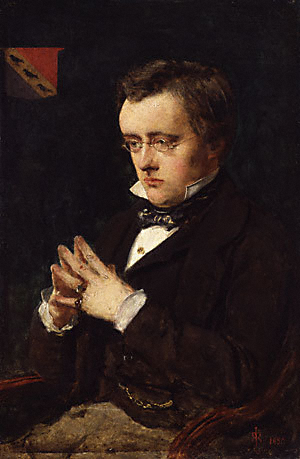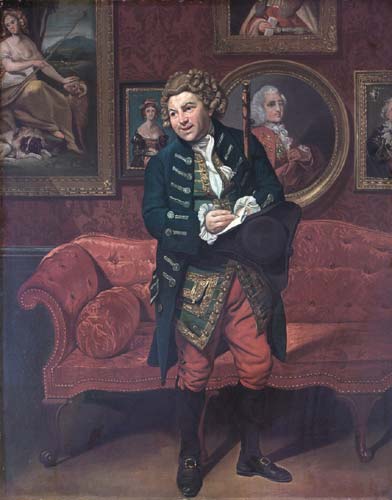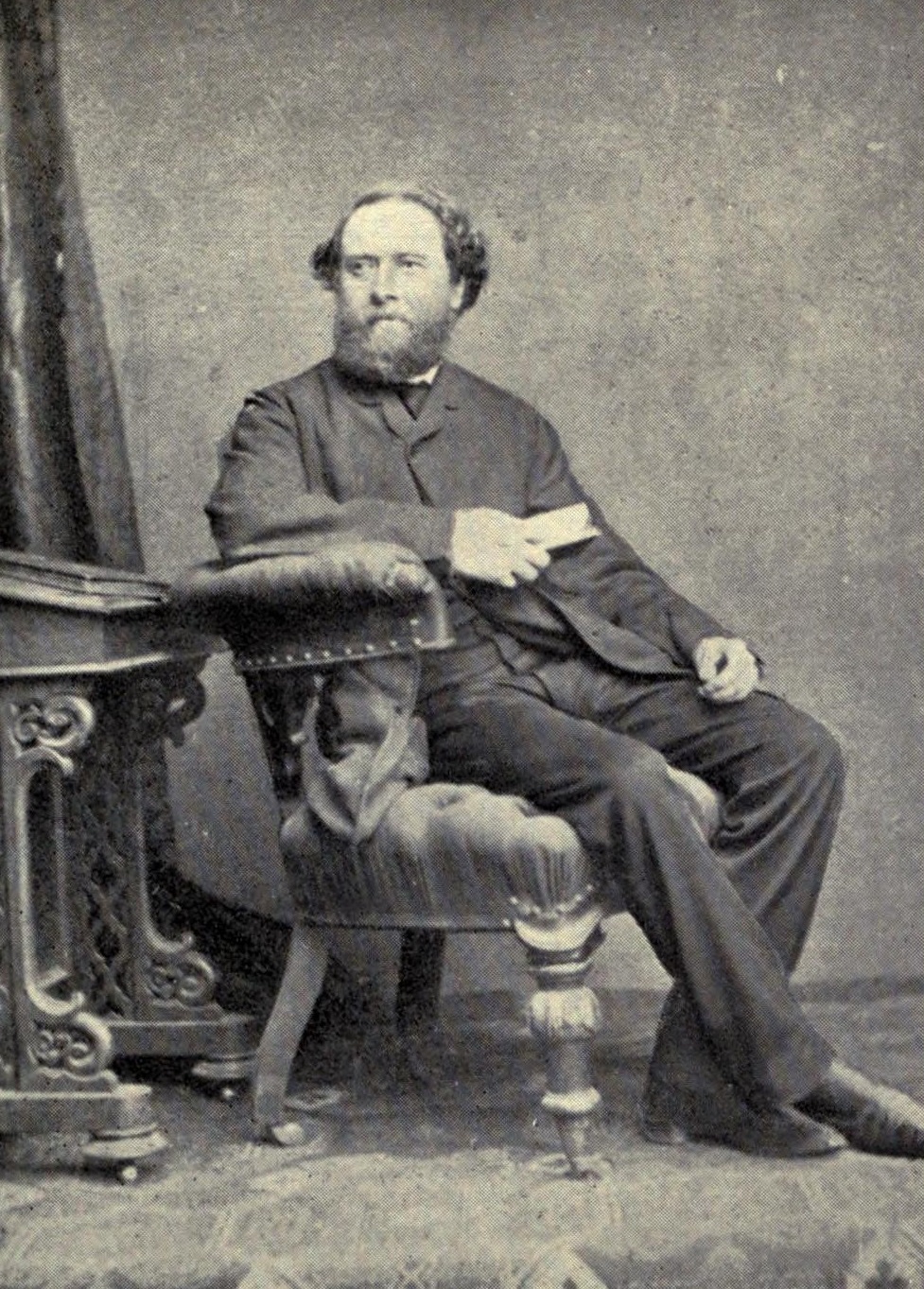|
Charles Francis Coghlan
Charles Francis Coghlan (11 June 1842 – 27 November 1899) was an Anglo-Irish actor and playwright once popular on both sides of the Atlantic Ocean. Early life Charles F. Coghlan was born on 11 June 1842, in Paris, France to British subjects, Francis (sometimes spelled Frances) and Amie Marie (née Ruhly) Coghlan. His father, a native of Dublin, Ireland, was the founder of Coghlan's Continental Dispatch and publisher of Coghlan's Continental Guides, and counted among his friends, Charles Dickens, Charles Reade, and other literary figures of the day. Amie Coghlan was born on the English Channel Island of Jersey sometime around 1821. Charles Coghlan was later raised in Peterborough, Cambridgeshire and Hull, Yorkshire and though originally groomed for a career in law he had chosen instead to be an actor whilst still in his teens.Charles Coghlan is Dead - New York Times 28 November 1899; pg. 7; Career Charles Coghlan began his stage career in 1859 as a minor player with the ... [...More Info...] [...Related Items...] OR: [Wikipedia] [Google] [Baidu] |
Paris
Paris () is the capital and most populous city of France, with an estimated population of 2,165,423 residents in 2019 in an area of more than 105 km² (41 sq mi), making it the 30th most densely populated city in the world in 2020. Since the 17th century, Paris has been one of the world's major centres of finance, diplomacy, commerce, fashion, gastronomy, and science. For its leading role in the arts and sciences, as well as its very early system of street lighting, in the 19th century it became known as "the City of Light". Like London, prior to the Second World War, it was also sometimes called the capital of the world. The City of Paris is the centre of the Île-de-France region, or Paris Region, with an estimated population of 12,262,544 in 2019, or about 19% of the population of France, making the region France's primate city. The Paris Region had a GDP of €739 billion ($743 billion) in 2019, which is the highest in Europe. According to the Economist Intelli ... [...More Info...] [...Related Items...] OR: [Wikipedia] [Google] [Baidu] |
Haymarket Theatre
The Theatre Royal Haymarket (also known as Haymarket Theatre or the Little Theatre) is a West End theatre on Haymarket in the City of Westminster which dates back to 1720, making it the third-oldest London playhouse still in use. Samuel Foote acquired the lease in 1747, and in 1766 he gained a royal patent to play legitimate drama (meaning spoken drama, as opposed to opera, concerts or plays with music) in the summer months. The original building was a little further north in the same street. It has been at its current location since 1821, when it was redesigned by John Nash. It is a Grade I listed building, with a seating capacity of 888. The freehold of the theatre is owned by the Crown Estate. The Haymarket has been the site of a significant innovation in theatre. In 1873, it was the venue for the first scheduled matinée performance, establishing a custom soon followed in theatres everywhere. Its managers have included Benjamin Nottingham Webster, John Baldwin Buckstone, S ... [...More Info...] [...Related Items...] OR: [Wikipedia] [Google] [Baidu] |
Edward Bulwer-Lytton, 1st Baron Lytton
Edward George Earle Lytton Bulwer-Lytton, 1st Baron Lytton, Her Majesty's Most Honourable Privy Council, PC (25 May 180318 January 1873) was an English writer and politician. He served as a Whigs (British political party), Whig member of Parliament from 1831 to 1841 and a Conservative Party (UK), Conservative from 1851 to 1866. He was Secretary of State for the Colonies from June 1858 to June 1859, choosing Richard Clement Moody as founder of British Columbia. He was created Baron Lytton of Knebworth in 1866. Bulwer-Lytton's works sold and paid him well. He coined famous phrases like "the great unwashed", "pursuit of the almighty dollar", "the pen is mightier than the sword", "Guardian of the Threshold, dweller on the threshold", and the opening phrase "It was a dark and stormy night." The sardonic Bulwer-Lytton Fiction Contest, held annually since 1982, claims to seek the "opening sentence of the worst of all possible novels". Life Bulwer was born on 25 May 1803 to General ... [...More Info...] [...Related Items...] OR: [Wikipedia] [Google] [Baidu] |
Fifth Avenue Theater
Fifth Avenue Theatre was a Broadway theatre in New York City in the United States located at 31 West 28th Street and Broadway (1185 Broadway). It was demolished in 1939. Built in 1868, it was managed by Augustin Daly in the mid-1870s. In 1877, it became the first air-conditioned theatre in the world. In 1879, it presented the world premiere of ''The Pirates of Penzance'' by Gilbert and Sullivan and the New York premiere of ''H.M.S. Pinafore'', followed by other Gilbert and Sullivan operas throughout the 1880s. The theatre continued to present both plays and musicals through the end of the century. At the beginning of the 20th century, the theatre presented English classics and then vaudeville, and later films, as well as plays and musicals. History The theatre was built in 1868 and was originally named Gilsey's Apollo Hall, in 1870 renamed the St. James Theatre. Its capacity was approximately 1,530 seats. [...More Info...] [...Related Items...] OR: [Wikipedia] [Google] [Baidu] |
Augustin Daly
John Augustin Daly (July 20, 1838June 7, 1899) was one of the most influential men in American theatre during his lifetime. Drama critic, theatre manager, playwright, and adapter, he became the first recognized stage director in America. He exercised a fierce and tyrannical control over all aspects of his productions. His rules of conduct for actors and actresses imposed heavy fines for late appearances and forgotten lines and earned him the title "the autocrat of the stage." He formed a permanent company in New York and opened Daly's Theatre in New York in 1879 and a second one in London in 1893. Biography Augustin Daly was born in Plymouth, North Carolina to Captain Denis Daly, a sea-captain and ship owner, and Elizabeth, daughter of Lieutenant John Duffy of the British Army. He was educated at Norfolk, Virginia, and in the public schools of New York City. His mother, early left a widow, brought her two boys to New York City, where they soon became frequent attendants at the th ... [...More Info...] [...Related Items...] OR: [Wikipedia] [Google] [Baidu] |
Sweethearts (play)
''Sweethearts'' is a comic play billed as a "dramatic contrast" in two acts by W. S. Gilbert. The play tells a sentimental and ironic story of the differing recollections of a man and a woman about their last meeting together before being separated and reunited after 30 years. It was first produced on 7 November 1874 at the Prince of Wales's Theatre in London, running for 132 performances until 13 April 1875. It enjoyed many revivals, thereafter, into the 1920s. The first professional production of ''Sweethearts'' in Britain in recent memory was given in 2007 at the Finborough Theatre in London, along with Arthur Sullivan's ''The Zoo''. Background This romantic comedy of manners was written for Squire Bancroft and his wife Marie (née Wilton), managers of the Prince of Wales's Theatre, and starred Mrs. Bancroft. Gilbert wanted his friend John Hare to play the male lead, to take advantage of Hare's naturally boyish appearance and of his talent for impersonating elderly men, ... [...More Info...] [...Related Items...] OR: [Wikipedia] [Google] [Baidu] |
Wilkie Collins
William Wilkie Collins (8 January 1824 – 23 September 1889) was an English novelist and playwright known especially for ''The Woman in White (novel), The Woman in White'' (1859), a mystery novel and early "sensation novel", and for ''The Moonstone'' (1868), which has been proposed as the first modern English detective novel. Born to the London painter William Collins (painter), William Collins and his wife, Harriet Geddes, he moved with them to Italy when he was twelve, living there and in France for two years, learning both Italian language, Italian and French language, French. He worked initially as a tea merchant. After ''Antonina'', his first novel, appeared in 1850, Collins met Charles Dickens, who became a friend and mentor. Some of his work appeared in Dickens's journals ''Household Words'' and ''All the Year Round''. They also collaborated on drama and fiction. Collins gained financial stability and an international following by the 1860s, but became addicted to the op ... [...More Info...] [...Related Items...] OR: [Wikipedia] [Google] [Baidu] |
Prince Of Wales Theatre
The Prince of Wales Theatre is a West End theatre in Coventry Street, near Leicester Square in London. It was established in 1884 and rebuilt in 1937, and extensively refurbished in 2004 by Sir Cameron Mackintosh, its current owner. The theatre should not be confused with the former Scala Theatre in London that was known as the ''Prince of Wales Royal Theatre'' or ''Prince of Wales's Theatre'' from 1865 until its demolition in 1903. History Phipps' theatre The first theatre on the site opened in January 1884 when Charles J. Phipps, C.J. Phipps built the Prince's Theatre for actor-manager Edgar Bruce. It was a traditional three-tier theatre, seating just over 1,000 people. The theatre was renamed the Prince of Wales Theatre in 1886 after the future Edward VII of the United Kingdom, Edward VII. Located between Piccadilly Circus and Leicester Square, the theatre was favourably situated to attract theatregoers. The first production in the theatre was an 1884 revival of W. S. ... [...More Info...] [...Related Items...] OR: [Wikipedia] [Google] [Baidu] |
John Westland Marston
John Westland Marston (30 January 1819 – 5 January 1890) was an English dramatist and critic. Life He was born at Boston, Lincolnshire, on 30 January 1819, was son of the Rev. Stephen Marston, minister of a Baptist congregation. In 1834, he was apprenticed to his maternal uncle, a London solicitor; but although he was not inattentive to the duties of the office after obtained a fair knowledge of law, literature and the theatre had much greater attractions for him. His evenings were devoted to the theatre and becoming acquainted with Heraud, Francis Barham, and other members of the group which gathered around James Pierrepont Greaves. He contributed to Heraud's magazine ''The Sunbeam,'' and himself became editor of a mystical periodical entitled ''The Psyche.'' Among its chief supporters were some wealthy ladies near Cheltenham, Through them he made the acquaintance of Eleanor Jane Potts, eldest daughter of the proprietor of ''Saunders's News-Letter,'' who had retired to Ch ... [...More Info...] [...Related Items...] OR: [Wikipedia] [Google] [Baidu] |
Adelaide Neilson
Lilian Adelaide Neilson (3 March 184815 August 1880), born Elizabeth Ann Brown, was a British stage actress. Early life Neilson was the daughter of a strolling actress, Anne Brown, and was born, out of wedlock, at 35 St Peters Square Leeds in the West Riding of Yorkshire. In childhood she was known as Elizabeth Anne Bland, her mother having subsequently married a mechanic and house decorator named Samuel Bland. She grew up in relative poverty, initially in Skipton and later Guiseley, West Yorkshire (near Leeds), where she worked in a factory and as a nursery maid. Career When she was about 15 years old Neilson left her home and made her way to London. Soon after she reached London, she obtained employment because of her beauty, as a member of the ballet at one of the theatres, and in that way she began her professional career. Various romantic tales were printed concerning her way of life at that time. She married Philip Henry Lee, the son of a clergyman resident at Sto ... [...More Info...] [...Related Items...] OR: [Wikipedia] [Google] [Baidu] |
St James's Theatre
The St James's Theatre was in King Street, St James's, London. It opened in 1835 and was demolished in 1957. The theatre was conceived by and built for a popular singer, John Braham; it lost money and after three seasons he retired. A succession of managements over the next forty years also failed to make it a commercial success, and the St James's acquired a reputation as an unlucky theatre. It was not until 1879–1888, under the management of the actors John Hare and Madge and W. H. Kendal that the theatre began to prosper. The Hare-Kendal management was succeeded, after brief and disastrous attempts by other lessees, by that of the actor-manager George Alexander, who was in charge from 1891 until his death in 1918. Under Alexander the house gained a reputation for programming that was adventurous without going too far for the tastes of London society. Among the plays he presented were Oscar Wilde's ''Lady Windermere's Fan'' (1892) and ''The Importance of Being Earn ... [...More Info...] [...Related Items...] OR: [Wikipedia] [Google] [Baidu] |
School For Scandal
''The School for Scandal'' is a comedy of manners written by Richard Brinsley Sheridan. It was first performed in London at Drury Lane Theatre on 8 May 1777. Plot Act I Scene I: Lady Sneerwell, a wealthy young widow, and her hireling Snake discuss her various scandal-spreading plots. Snake asks why she is so involved in the affairs of Sir Peter Teazle, his ward Maria, and Charles and Joseph Surface, two young men under Sir Peter's informal guardianship, and why she has not yielded to the attentions of Joseph, who is highly respectable. Lady Sneerwell confides that Joseph wants Maria, who is an heiress, and that Maria wants Charles. Thus she and Joseph are plotting to alienate Maria from Charles by putting out rumours of an affair between Charles and Sir Peter's new young wife, Lady Teazle. Joseph arrives to confer with Lady Sneerwell. Maria herself then enters, fleeing the attentions of Sir Benjamin Backbite and his uncle, Crabtree. Mrs. Candour enters and ironically talks ... [...More Info...] [...Related Items...] OR: [Wikipedia] [Google] [Baidu] |



.jpg)





.jpg)
